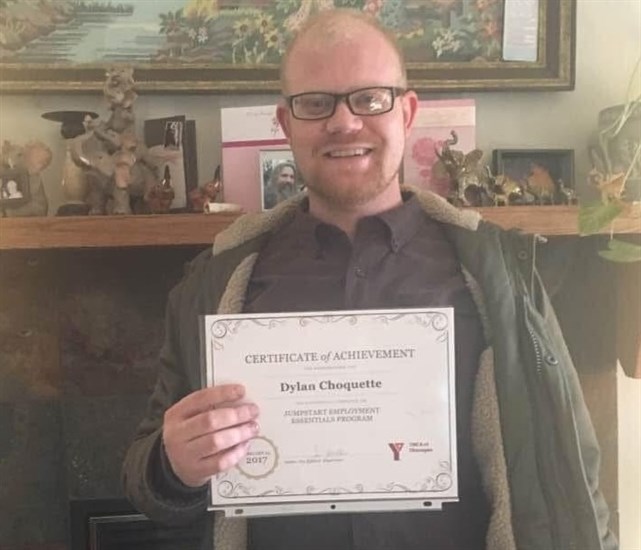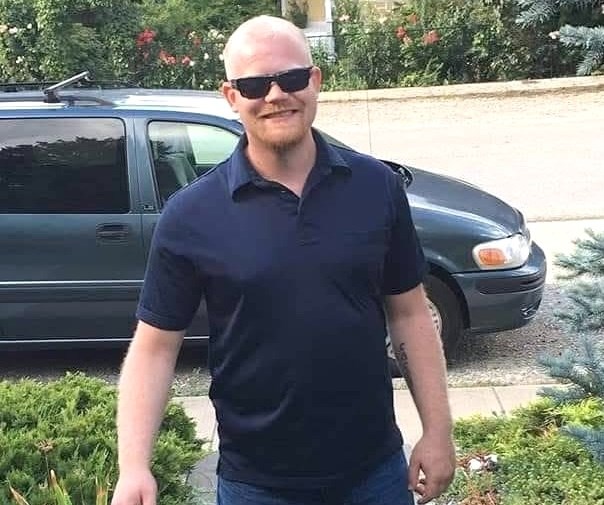
Dylan Choquette healthy and sober in 2017.
Image Credit: Dana Ruether
September 15, 2025 - 6:00 AM
In the last five years, Dana Ruether's brother has only recognized her on about five occasions.
He's deep in a severe fentanyl addiction and very unwell.
But when her kids are at school, she goes looking for him on the streets of West Kelowna. Sometimes she finds him. He's stick thin, his teeth have all gone, and his body is covered in abscesses.
She's desperate to find him some help, but even with all her advocacy, he remains on the street, in the throes of an addiction and mental health crisis.
"It's a dead end everywhere we go," Ruether told iNFOnews.ca. "He's so far gone... It's like I'm just watching him die slowly, like he's drowning, and the lifeboat's not coming."
Ruether's brother, Dylan Choquette, has spent much of his life battling substance abuse, but when fentanyl hit the streets, things got much worse.
"He has destroyed his brain so much that he's just this dying, angry person that doesn't even know his surroundings anymore," she said. "He's just so caught up on these drugs."
Choquette's case is extreme, although as Ruether points out, take a walk around any city in the province and you'll see people in similar situations.
"He's completely injured and totally not in his right mind. He doesn't even know where he is," she said.
In early 2022, Choquette made headlines when the province took the highly unusual step of getting a court order to ban him from the West Kelowna welfare office.
The 33-year-old had menaced the staff on dozens of occasions, smashing wood against the plexiglass divider and threatening that he'd shoot them.
A police mugshot, complete with a gash in his head and a menacing stare, Choquette fit the stereotype of an often-violent homeless fentanyl addict perfectly.

Dylan Choquette in a police mugshot, cira 2022.
Image Credit: SUBMITTED:
iNFOnews.ca wrote several stories about his run-ins with the law, as his behaviour matched the critique of a revolving-door criminal justice system. West Kelowna prolific offender charged with theft days after getting out of prison, ran one headline. Another said, Man banned from West Kelowna welfare office charged with threatening cashier.
He'd spent weeks in prison before being released for the cycle to continue.
But Ruether says it wasn't always this way.
To her, Choquette, is still her big brother, someone who looked out for her and helped raise her.
"Dylan was a very hardworking, loving man. And he has the biggest heart," she said.
Ruether said they grew up in very difficult circumstances.
"We grew up around addiction and hardship, and even through all of that, he's always been a hardworking and loving man," she said.
Their father introduced Choquette to crack cocaine when he was just 12 years old. Their father died five years ago from an overdose.
When he was younger, Choquette drank heavily and used cocaine and other party drugs.
But Ruether says he worked construction, got married and had two children.
He entered rehab on a couple of occasions and did get clean and sober. But when his marriage fell apart and his ex-wife took his kids to the Lower Mainland, he relapsed.
But then it was fentanyl.
"With these toxic drugs in circulation, it's taken him to a whole new level of despair," she says. "His mental health has suffered so badly that most days he doesn't remember (his children), or me... he's just not in our reality."
Ruether believes he may have undiagnosed schizophrenia.
"He's shown up to my house in complete despair and in psychosis. And I phone the ambulance to try and get him treated and they send a police officer instead and just escort him off my property," she said.
Ruether says she tried to get him into rehabilitation on numerous occasions but never succeeded.
"I just don't think anyone knows what to do with him," she says.
She says that getting a bed in a treatment centre requires a daily phone call, and even if Choquette had a phone, he's in no state to make such a call.
"He's overdosed and overdosed and overdosed," she said.
With three children at home, Ruether refuses to let Choquette into her home, making the situation more difficult.
"If I was on my own, I would be able to go through hell with him every single day to get him to these places, but I cannot because I have my children," she said.
She'd like to see the authorities take more action when Choquette is behind bars.
"The only time professionals are around him is when he is in custody, and he's in custody on and off, on and off, on and off," she said. "They should be assessing him and treating him and putting him where he needs help. But all they do is just take him in... let him suffer the whole time he's there, and then release him back onto the streets with nowhere to go."
She said he's been banned from all the shelters, so he spends his time on the streets.
Ruether makes no excuses for her brother's behaviour and has genuine sympathy for the people terrorized by his aggressive and sometimes violent behaviour.
She says it breaks her heart to hear the way her brother has treated so many people.
"It's not who he is. It's an awful, evil entity that's taken over. I just don't understand why we can't help him."

Dylan Choquette, clean and sober, cira 2017.
Image Credit: Dana Ruether
Ruether says she exhausted all avenues in trying to get her brother help, and as he's too far gone to ask for it, making the situation even more complicated.
She even turned to the courts and went through an application under the Mental Health Act to have him apprehended.
It took several days, and in the meantime, Choquette was arrested and taken into custody.
Her request was apparently approved, but he was never picked up and taken to hospital.
"So that was just another heartbreaking thing, because... I feel like that was my last option," Ruether said
She'd like to see him taken into involuntary care.
Involuntary care has become a hot-button issue recently, with BC Premier David Eby announcing last fall the expansion of 400 hospital-based mental health beds for those with brain injury, mental illness, and severe addiction.
However, Simon Fraser University professor of substance use and drug policy Kora DeBeck says there's very little evidence that involuntary treatment actually works.
"In this era of fentanyl, it's more complicated," DeBeck said. "What we're seeing also is that because fentanyl is so potent, when people are put on substitution-type medication therapies, we're just not seeing the kind of success we had in previous eras."
The gold standard medications of methadone and suboxone aren't working as well against fentanyl.
"There are protective benefits (for treatment), but it is by no means this magical silver bullet," DeBeck said. "If you get someone engaged in treatment, that doesn't necessarily mean very much many times."
DeBeck reiterates that she is still very much in support of addiction treatment.
"What fentanyl has done is... just made it more challenging," she said. "There is... a lot of magical thinking about addiction treatment that's not grounded in the reality of what is really driving the crisis and what is causing so much death."
The instability is coming from how toxic the drug supply is.
"It has a very destabilizing effect on folks," she said.
DeBeck said that studies show a safe and clean supply of drugs has been very effective in stabilizing people. When people don't have to worry about getting money for drugs or go through periods of intense withdrawal, it's the first step in stabilizing their lives.
"Access to regulated drugs would make a huge impact, not just for that individual, but certainly for the community," Debeck said.
While there is some opioid-assisted treatment in BC, it's not as widespread as people might think.
For Ruether, she doesn't have the time to wait for a dramatic change in government policy.
She said she wanted to share her struggles because she feels she's run out of options.
"Dylan is a human being who is deeply loved... addiction is a health crisis, not a crime or moral failure."
She knows this isn't just Choquette's story.
"It's the reality for so many families in Kelowna who are fighting for their loved ones," she said.
She also knows it's rare for many with substance addictions to still have people advocating for them.
"I know who he is and that he has always deserved to have a better life than what he's been given," Ruether said.
Ruether last saw Choquette about two months ago.
To contact a reporter for this story, email Ben Bulmer or call (250) 309-5230 or email the editor. You can also submit photos, videos or news tips to the newsroom and be entered to win a monthly prize draw.
We welcome your comments and opinions on our stories but play nice. We won't censor or delete comments unless they contain off-topic statements or links, unnecessary vulgarity, false facts, spam or obviously fake profiles. If you have any concerns about what you see in comments, email the editor in the link above. SUBSCRIBE to our awesome newsletter here.
News from © iNFOnews, 2025